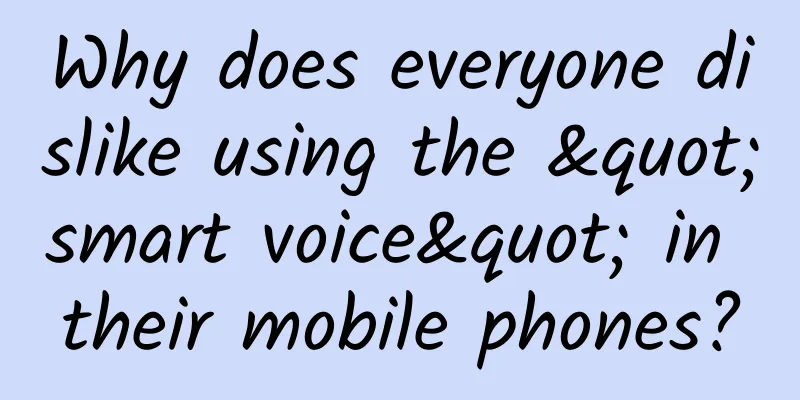Why does everyone dislike using the "smart voice" in their mobile phones?

|
As we all know, voice navigation, voice photography, voice dialing, voice wake-up and other functions are now popular in various terminals. Intelligent voice control has evolved from a teasing application when consumers are bored to a functional application that can really help consumers solve practical problems. Intelligent voice applications are maturing, and the terminal industry is ushering in a new revolution featuring intelligent voice control. So can intelligent voice subvert the future terminal industry? What are the opportunities and challenges? To this end, the market research and study department of Communication World, Lango Think Tank, recently invited relevant experts, industry insiders and relevant manufacturers to discuss issues related to intelligent voice and terminals. As a participant, we would like to give our own comments on the relevant issues in this discussion. First of all, will intelligent voice be the "standard configuration" of the next generation of terminals? The key here is how to define and understand "standard configuration". From the perspective of voice function, almost all mainstream smartphones from mainstream smartphone manufacturers now have voice functions to a certain extent. From the perspective of large ecosystems, Apple iOS has Siri, Google Android has Google Now, and Microsoft Windows Phone has Cortana. Of course, in addition to the intelligent voice applications that are standard in these three ecosystems, there are also so-called intelligent voice applications developed by third parties. However, from the perspective of usage frequency, we believe that the so-called intelligent voice has not yet reached the "standard configuration" requirement. That is, since it is a standard configuration, it should be frequently used by users or some applications must have intelligent voice to have practical value. Otherwise, although the smartphone has the intelligent voice function (only a standard configuration on the surface), users will not use it frequently in actual applications. This "standard configuration" is a waste of both the manufacturer's resources and the user's value. The so-called "standard configuration" is not the same as the "standard configuration". We believe that the low recognition rate of intelligent voice or the misinterpretation of semantics in recognition are the main reasons that hinder users from using intelligent voice. Secondly, the applications supported by intelligent voice are not irreplaceable (they can still be completed using traditional touch methods). Finally, the efficiency of using intelligent voice is the reason. Compared with traditional touch, intelligent voice does not have obvious advantages in terms of operation steps, response time and other efficiency experiences. The second is the "practical" and "entertainment" types of smart voice. Which type of users are more willing to pay for it? It should be noted that the reason why this question is raised is that the usage rate of the above-mentioned smart voice is not high. At the current stage of smart voice development, relevant manufacturers have adopted different means and development strategies to encourage and attract users to use smart voice as much as possible. As for which one is better, the industry has different opinions. Considering the low usage rate of smart voice and the immature technology development, especially the lack of irreplaceability, we believe that the "entertainment school" seems to be more suitable for the promotion of smart voice and smart terminals (such as smart phones). Because on the one hand, it can increase the user's interest in use, and then indirectly increase the frequency of use, deepen the understanding of smart voice, and at the same time dilute the negative impact of the unreliable smart voice on users due to errors caused by the current limitations of smart voice technology. But one thing that needs to be affirmed is that if smart voice is to be fundamentally accepted and popularized by users in the future, practical value is indispensable. In this sense, the current "pragmatic school" is more in line with the trend of future development. It is worth mentioning that in some key application scenarios, such as navigation, search and other applications, the "pragmatic school" is already the only choice at present. The third question is what kind of companies does the intelligent voice market need, "big and comprehensive" or "small and refined"? We believe that this question should be viewed from two dimensions. One is from the development strategy of related companies, whether to do large and comprehensive intelligent voice recognition, or to target a certain industry or application. In other words, to do general intelligent voice or professional intelligent voice; the other dimension is user needs. That is, do users want all existing and future terminal applications to be supported by intelligent voice or do individual scenarios and applications require intelligent voice support. From the current fit between the technologies and market strategies of manufacturers developing intelligent voice and the applications and scenarios of user needs, we believe that "less but better" should be the characteristics and trends of the development of the intelligent voice industry now and in the future. Even if, as some industry opinions say, the intelligent voice technology is highly mature in the future, it is difficult to completely replace the current touch-based applications and experiences of smart terminals (such as smartphones, smart watches, etc.), just like the current touch cannot replace the mouse and keyboard. Therefore, we suggest that relevant companies should carefully study the use scenarios and applications of intelligent voice, and achieve the ultimate in certain special scenarios (such as car-mounted) and applications, which will achieve twice the result with half the effort for both themselves and the promotion of the entire intelligent voice industry. Fourth, how to judge the level of speech recognition technology? Although the experts and industry insiders who attended the seminar gave different answers to this question, we believe that it is more objective to judge from the perspective of user needs and experience. The first is the understanding of semantics in different applications or scenarios. The reason why we did not mention the recognition commonly said in the industry is that as an intelligent voice, recognition is the most basic requirement. Understanding not only includes recognition, but also the product of logical analysis after recognition. The second is the efficiency of feedback and processing. We have already touched on this in the previous article, so I will not repeat it here. Finally, there is the optimization and support of related applications and scenarios. It should be reminded and supplemented that whether it is the understanding of semantics or the efficiency of processing, because it involves many fields and multiple factors, it is by no means a single company that can handle it, which requires close cooperation from relevant manufacturers in the industrial chain. This is also the main reason why some domestic companies (such as the ZTE Smart Voice Alliance) currently adopt an alliance approach to develop intelligent voice. Finally, who will lead the next wave of intelligent voice applications? This also involves two dimensions. The first is the application field of intelligent voice. From the current point of view, most manufacturers are concentrated in the field of smartphones. After all, smartphones are currently the largest market in terms of popularity, market space, and applications. The second is wearable devices represented by smart watches, car networking, and the future Internet of Things (such as smart homes). Given that it is recognized in the industry that smartphones are the center of connecting everything now and in the future, smartphones are undoubtedly the top priority, at least the basis for the next wave of intelligent voice applications itself and its extension. Another dimension is related manufacturers. When mentioning related manufacturers, we must connect to the application field. Since smartphones are the center of everything and the basis for extension, it is determined that the future development direction of intelligent voice should be platformization. That is, although intelligent voice technology focuses on related applications and scenarios in smartphones, it should not be limited to smartphones. Only such companies can lead the next wave of intelligent voice applications. Based on the above analysis of the current and future development of intelligent voice, we believe that there are still many variables and challenges in the so-called subversion of intelligent terminals by intelligent voice, but the added value for terminals definitely exists and will show an expanding trend with the continuous expansion of technology and application scenarios. Perhaps in the future, when the accumulation of added value reaches a certain level, it may be more appropriate to talk about subversion. As a winner of Toutiao's Qingyun Plan and Baijiahao's Bai+ Plan, the 2019 Baidu Digital Author of the Year, the Baijiahao's Most Popular Author in the Technology Field, the 2019 Sogou Technology and Culture Author, and the 2021 Baijiahao Quarterly Influential Creator, he has won many awards, including the 2013 Sohu Best Industry Media Person, the 2015 China New Media Entrepreneurship Competition Beijing Third Place, the 2015 Guangmang Experience Award, the 2015 China New Media Entrepreneurship Competition Finals Third Place, and the 2018 Baidu Dynamic Annual Powerful Celebrity. |
>>: The decisive battle for the Indian market: Can Chinese mobile phones get a piece of the pie?
Recommend
The latest news on Dalian’s lifting of lockdown in 2022: When will it be lifted? Is it unblocked now?
Recently, in this round of local epidemic in Liaon...
Can drinking help you sleep? The harm of alcohol to sleep
Many people are used to drinking milk before goin...
[Practical] How to create a Facebook ad?
Many newbies have just come into contact with Fac...
4 tips to enhance article resonance and create popular articles!
If you want an article on a public account to go ...
What changes are happening to Apple’s search lock list that has lasted for 100 hours?
On January 1, 2017, the gift package that Apple p...
The sales of these 6 Korean SUVs have been pushed into a desperate situation.
In the automobile market, SUV is "undoubtedl...
Experience and tips on how to increase followers and monetize on Toutiao!
In mid-September 2016, I registered a Toutiao acc...
Popular Science | Pineapples are not only edible, but can also be a luxury item?
It's the season for pineapples again. Pineapp...
Hardcore review! Changhong ARTIST Star Foil is worth a try!
In the past two days, "Jiangxiang Latte"...
When the sound environment reaches this standard, the ears feel comfortable.
Produced by: Science Popularization China Produce...
The neglected "egg beater" - the life of Darrieus wind turbine
Author: Cheng Mingchen The article comes from the...
20 niche treasure APPs, work and life are not affected, grow quietly in 5 minutes every day
Today I will share with you 20 niche treasure APP...
Eating sugar will make you fat, eating less will make you depressed... Is it possible that "the food is still the same food, but tastes sweeter"?
As the saying goes, if you don't lose weight ...
Public relations planning cases and planning schemes!
The three major problems that public relations pl...
Tik Tok’s 3 loops to retain users and its commercialization trends!
This article is mostly the author's own thoug...









